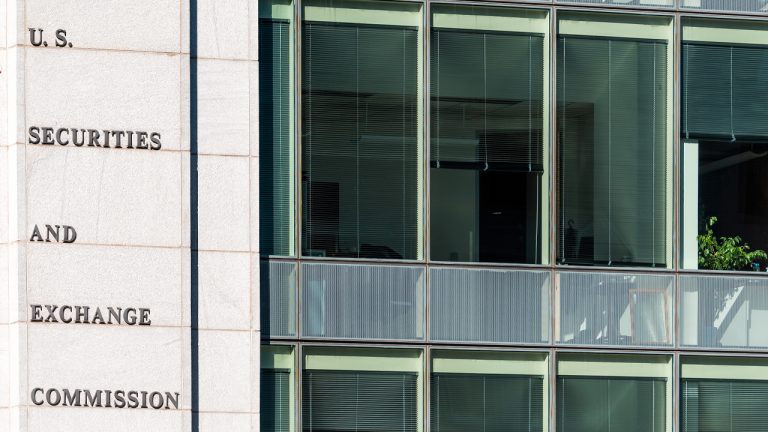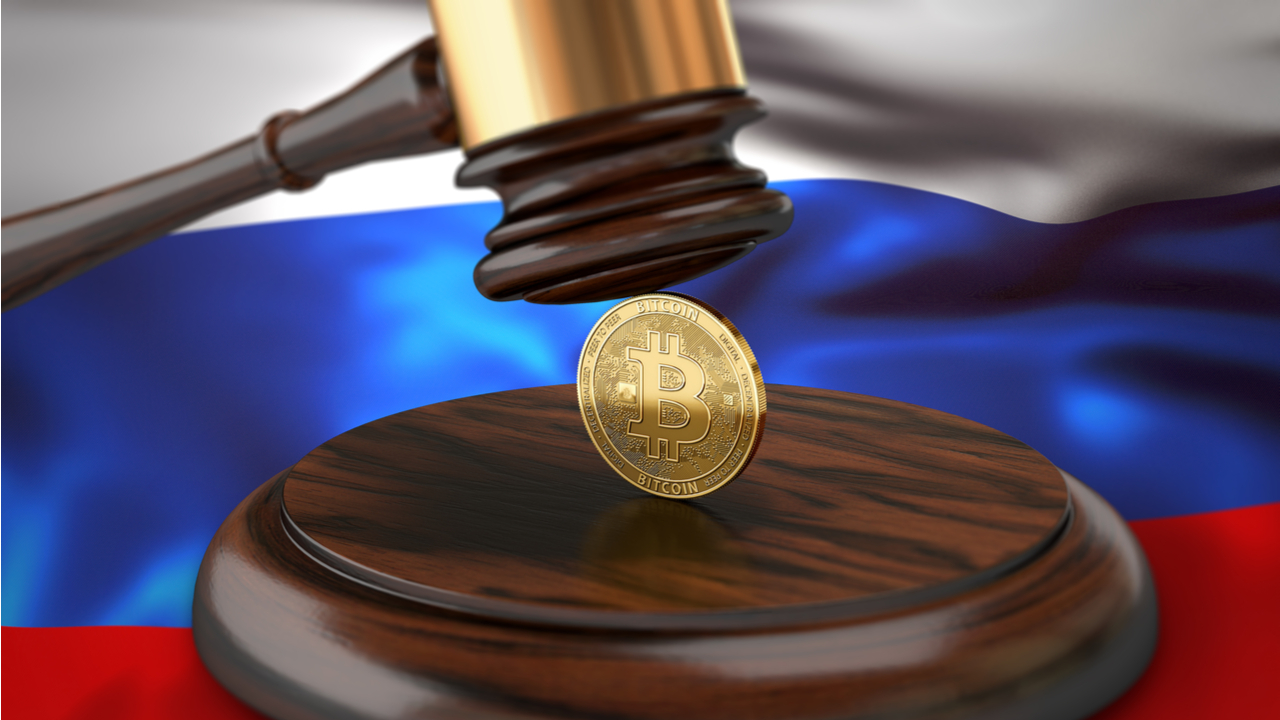 2023 is shaping up to be a painful year for the U.S. Securities and Exchange Commission (SEC) as it finds itself entangled in battles with the ever-evolving and innovative cryptocurrency industry. From Ripple to Coinbase and Tron, the SEC faces fierce opposition with potentially huge consequences. The following opinion editorial was written by Joseph Collement, […]
2023 is shaping up to be a painful year for the U.S. Securities and Exchange Commission (SEC) as it finds itself entangled in battles with the ever-evolving and innovative cryptocurrency industry. From Ripple to Coinbase and Tron, the SEC faces fierce opposition with potentially huge consequences. The following opinion editorial was written by Joseph Collement, […]
The group's policy head doubted a divided Congress can create crypto legislation but said it doesn’t give regulators absolute authority in the interim.
Despite attempts to police cryptocurrency through enforcement actions, United States financial regulators “are bound by legal reality” and Congress will ultimately decide crypto regulations the policy expert for the crypto advocacy group Blockchain Association has suggested.
The association's chief policy officer, Jake Chervinsky, shared his views in an extensive Feb. 14 Twitter thread on the state of crypto policy.
He noted neither the Securities and Exchange Commission (SEC) nor the Commodity Futures Trading Commission (CFTC) “has the authority to comprehensively regulate crypto.”
14/ No matter how many enforcement actions the SEC and CFTC bring, they are bound by legal reality:
— Jake Chervinsky (@jchervinsky) February 14, 2023
Neither has the authority to comprehensively regulate crypto, neither can obtain it through any amount of enforcement, and neither will ever have it without an act of Congress.
Chervinsky believed a deal on crypto legislation seems “unlikely, given the ideological gap between House Republicans and Senate Democrats.” He accused the SEC and CFTC of overstepping their authority in an attempt to “get things done” without Congress.
Chervinsky called for the industry to remain calm following the recent flurry of activity from “crypto’s chief antagonist,” the SEC, and pointed to its crackdown on staking services as an example.
13/ The SEC's main tactic is regulation by enforcement, and it struck again last week by labeling Kraken’s staking service a security.
— Jake Chervinsky (@jchervinsky) February 14, 2023
That's frustrating, but it doesn't change much for anyone else. Settlements aren't the law, and every set of facts is unique. Others will fight.
The SEC’s Feb. 9 settlement with crypto exchange Kraken, that banned the exchange from ever offering staking services to U.S. customers, was publicly rebuked by SEC Commissioner Hester Peirce.
In a Feb. 9 dissenting statement, Peirce argued that regulation by enforcement “is not an efficient or fair way of regulating” an emerging industry.
Related: US lawmakers and experts debate SEC's role in crypto regulation
Chervinsky suggested litigation is one way the crypto industry can push for good policy, noting the judiciary plays an important role in dictating policy that has been “ignored.”
20/ FIFTH, we can litigate.
— Jake Chervinsky (@jchervinsky) February 14, 2023
Policy is made in all three branches of government, and we’ve ignored the judiciary for too long.
At the core of crypto is a fight for civil liberty, a fight that calls for impact litigation.
Our best allies may be in the courts. Let's go find them.
Crypto exchange Coinbase also faces an SEC probe similar to what resulted in Kraken’s settlement.
Coinbase CEO and co-founder, Brian Armstrong, has taken a more resolute stance, claiming that getting rid of crypto staking would be terrible for the U.S.
Armstrong argued in a Feb. 12 Twitter post that Coinbase’s staking services are not securities and would “happily defend this in court if needed.”
Coinbase's staking services are not securities. We will happily defend this in court if needed.https://t.co/GtTOz77YV3
— Brian Armstrong (@brian_armstrong) February 12, 2023
Judge’s rulings in landmark cases create a legal precedent. If such a case were brought to court and a judge decided Coinbase’s staking services did not classify as securities, other crypto companies in a similar position could use the precedent as part of their defense.
 The City Court of St. Petersburg has recognized a large amount of cryptocurrency handed over by the victim in an extortion case as a means of payment, Russian media reported. The prosecutor’s office in Russia’s second-largest city describes the ruling as a precedent. Two Men Sentenced for Cryptocurrency Extortion in Russia Two Russian citizens have […]
The City Court of St. Petersburg has recognized a large amount of cryptocurrency handed over by the victim in an extortion case as a means of payment, Russian media reported. The prosecutor’s office in Russia’s second-largest city describes the ruling as a precedent. Two Men Sentenced for Cryptocurrency Extortion in Russia Two Russian citizens have […]
Not all the experts are rushing to call the development “groundbreaking,” but it will certainly help the industry combat fraud.
At the beginning of May, the British Web3 community celebrated an important legal precedent — the High Court of Justice in London, the closest analog to the United States Supreme Court, has ruled that nonfungible tokens (NFT) represent “private property.” There is a caveat, though: In the court’s ruling, this private property status does not extend to the actual underlying content that NFT represents. Cointelegraph reached out to legal experts to understand what this decision could possibly change in the British legal landscape.
In February 2022, Lavinia D. Osbourne, founder of Women in Blockchain Talks, wrote on Twitter that two digital works had been stolen from the Boss Beauties — a 10,000-NFT collection of empowered women that was created by “Gen Z change-makers” and featured at the New York Stock Exchange.
The tokens came with a number of utility points, such as access to exclusive events, free books, and licensing fees. Osbourne claimed that the pieces, stolen from her MetaMask wallet, later emerged on the OpenSea market. She traced down the NFTs with the help of the security and intelligence firm Mitmark.
The matter was brought to court in March, and on April 29, The Art Newspaper reported on the ruling of the United Kingdom’s High Court, in which the judges have recognized NFTs as property protected by law. In addition, the court issued an injunction to freeze the assets on the accounts of Ozone Networks (the host of OpenSea) and compelled OpenSea to disclose information about the two account holders in possession of the stolen NFTs. Shortly afterward, OpenSea halted the sale of these NFTs — Boss Beauties number 680 and 691.
As the identities of the wallet holders remain uncertain, the injunction was granted against “persons unknown.” In its comment on the decision, Stevenson Law firm called a freezing injunction “quite a draconian (i.e. old fashioned and harsh) remedy,” describing it as a “nuclear weapon” of law.
Following the court order, Osbourne victoriously proclaimed:
“Women in Blockchain Talks was founded to open up the opportunities blockchain offers to anyone, regardless of age, gender, nationality or background. This case will hopefully be instrumental in making the blockchain space a safer one, encouraging more people to interact with exciting and meaningful assets like NFTs.”
Racheal Muldoon, the counsel on the case, highlighted “the utmost significance” of the ruling, which, she said, “removes any uncertainty that NFTs are property in and of themselves, distinct from the thing they represent, under the law of England and Wales.” But it is exactly the aforementioned detail that made other experts skeptical of the groundbreaking importance of the court’s decision.
While the NFTs are already enjoying the status of property in their treatment by the U.S. Internal Revenue Service, the proclaimed difference between the token and the underlying asset does little to fill the current legislative vacuum in the U.K. and United States. “So if you have a token, you have a token. But not necessarily any rights in anything else,” as Juliet Moringiello, professor at Widener University Commonwealth Law Schoo, noted to Artnet News.
As assistant director of the Institute of Art and Law Emily Gould reminded in her opinion piece on the case, U.K. courts’ decisions, regulatory developments and governmental studies over the past few years have been increasingly consonant in categorizing crypto assets as property. She specifically pointed to 2019’s AA v. Persons Unknown and the “Legal statement on cryptoassets and smart contracts” report, presented by the UK Jurisdiction Taskforce of the LawTech Delivery Panel in the same year.
“The underlying property or asset that the NFT represents, be that artwork or any other copyrightable material, are still governed in the U.K. by the same copyright laws as in the United States,” Tom Graham, U.K.-based CEO and co-founder of Web3 company Metaphysic.ai, explained to Cointelegraph. “This decision doesn’t help clarify that distinction.”
But for Graham, the ruling still set an “interesting precedent,” as the court had issued an injunctive order to OpenSea. This is significant in terms of courts stepping in and providing injunctive relief where NFTs have been stolen. He added:
“It is now unambiguous that NFTs are governed by the same property laws in the U.K. that govern all other property. It sets a great precedent for people investing in NFTs that the court system, at least in the U.K., will protect their property rights.”
Speaking to Cointelegraph, Anna Trinh, chief compliance officer of digital finance firm Aquanow, noted that the ruling is not revolutionary, but not without “executive importance.” Establishing legal precedent that affirms what most already believed to be the case may give NFT platforms more comfort in demanding to freeze malevolent actors’ accounts. Trinh said:
“I don’t think NFTs being recognized as private or personal property is much of a surprise. You can buy, sell or trade NFTs, which essentially points to them being personal property on first principles. It would have been more shocking had the court held that NFTs were not personal property.”
Trinh doesn’t see the existing legal protections for the underlying assets as problematic. These are governed by the contract’s content at the time of purchase, so contractual law and intellectual property law would come into play depending on the nature of the asset. In Trinh’s opinion, there are more urgent legal issues that regulators could pay attention to, such as creators’ rights.